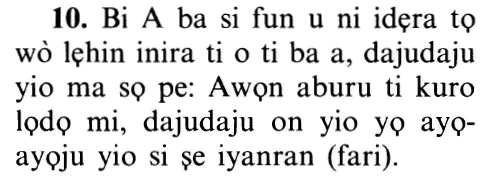11vs10
Select any filter and click on Go! to see results
وَلَئِنْ أَذَقْنَاهُ نَعْمَاء بَعْدَ ضَرَّاء مَسَّتْهُ لَيَقُولَنَّ ذَهَبَ السَّيِّئَاتُ عَنِّي إِنَّهُ لَفَرِحٌ فَخُورٌ
Walain athaqnahu naAAmaa baAAda darraa massathu layaqoolanna thahaba alssayyiatu AAannee innahu lafarihun fakhoorun
Index Terms
Click to play
Yoruba Translation

Hausa Translation
Kuma lalle ne idan Mun ɗanɗana masa ni´ima a bãyan cũta ta shãfe shi, Yana cħwa mũnanan halaye sun tafi daga wurina. Lalle shi mai farin ciki ne, mai alfahari.
Asbabu n-Nuzuul (Occasions of Revelation)
The changing of Man's Attitude in Happiness and Hardship
Allah says;
وَلَئِنْ أَذَقْنَا الإِنْسَانَ مِنَّا رَحْمَةً ثُمَّ نَزَعْنَاهَا مِنْهُ إِنَّهُ لَيَئُوسٌ كَفُورٌ ﴿٩﴾
وَلَئِنْ أَذَقْنَاهُ نَعْمَاء بَعْدَ ضَرَّاء مَسَّتْهُ ...
And if We give man a taste of mercy from Us, and then withdraw it from him, verily, he is despairing, ungrateful.
But if We let him taste good (favor) after evil (poverty and harm) has touched him,
Allah, the Exalted, informs about mankind and the blameworthy characteristics that he possesses, except for those believing servants upon whom Allah has bestowed His mercy.
Allah explains that when any hardship befalls man, after he has experienced blessings, he is disheartened and he despairs of any good in the future. He denies and rejects (the bounties of) his previous condition. Thus, he behaves as if he has never seen any good and he loses all hope for relief (from his situation).
Likewise, if any blessing befalls him after displeasure,
... لَيَقُولَنَّ ذَهَبَ السَّيِّئَاتُ عَنِّي ...
he is sure to say, "Ills have departed from me.''
This means that he will claim that no harm or calamity will afflict him after this (blessing).
... إِنَّهُ لَفَرِحٌ فَخُورٌ ﴿١٠﴾
Surely, he is exultant and boastful (ungrateful to Allah).
This means that he is pleased with what he has in his hand and ungrateful (to Allah). At the same time he is boastful towards others.
Allah, the Exalted, then says,
وهكذا إن أصابته نعمة بعد نقمة " ليقولن ذهب السيئات عني " أي يقول ما ينالني بعد هذا ضيم ولا سوء " إنه لفرح فخور " أي فرح بما في يده بطر فخور على غيره .
"ولئن أذقناه نعماء بعد ضراء" فقر وشدة "مسته ليقولن ذهب السيئات عني" المصائب ولم يتوقع زوالها ولا شكر عليها "إنه لفرح" بطر "فخور" على الناس بما أوتي
أي صحة ورخاء وسعة في الرزق .
I'raab - grammatical analysis of the Qur'an
«وَلَئِنْ» الواو عاطفة واللام موطئة للقسم وإن شرطية.
«أَذَقْنَاه» ماض وفاعله والهاء مفعول به.
نَعْماءَ» حل.
«بَعْدَ» ظرف زمان.
«ضَرَّاءَ» مضاف إليه مجرور بالفتحة لأنه ممنوع من الصرف.
«مَسَّتْهُ» ماض والتاء للتأنيث والهاء مفعول به والجملة صفة.
«لَيَقُولَنَّ» اللام واقعة في جواب القسم والمضارع مبني على الفتح لاتصاله بنون التوكيد والجملة جواب القسم لا محل لها من الإعراب وحذف جواب الشرط لدلالة القسم عليه.
«ذَهَبَ السَّيِّئاتُ عَنِّي» ماض وفاعله والجار والمجرور متعلقان بالفعل والجملة مقول القول.
«إِنَّهُ لَفَرِحٌ فَخُورٌ» إن واسمها وخبراها واللام المزحلقة.
